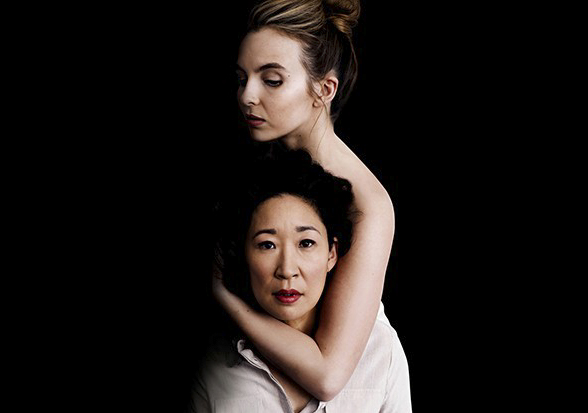
This review contains spoilers for Season 1 of “Killing Eve.”
In my review of Season 1 of “Killing Eve,” BBC America’s cat-and-mouse thriller, I criticized the show for only assigning queerness to characters that were either sociopathic or immediately murdered. While that was true three episodes into the first season when I wrote the review, it is now clear to me that everyone on “Killing Eve” is capital-G Gay. Season 2 of “Killing Eve” hammers this home time and time again, depicting the most twisty and toxic gay love story around: the one between intuitive and obsessive intelligence officer Eve Polastri (Sandra Oh) and the flamboyant and equally obsessed assassin she’s trying to find, Villanelle (Jodie Comer). An engrossing tale of fixation, the second season of “Killing Eve” is still a strong story, anchored by phenomenal performances.
Season 2 picks up in the immediate aftermath of the Season 1 finale, where Eve and Villanelle finally meet face-to-face after weeks of obsession. After a confrontation, they put aside their differences and decide that maybe they should try to make their relationship work.
No, I’m kidding. Eve stabs Villanelle in the stomach and, wounded, Villanelle disappears.
The new season begins with the two dealing with the fallout of this shocking act. Villanelle is bleeding profusely and vulnerable for the first time since we’ve met her. Eve, reeling from her own actions, is spiraling out of control. Strangely, if not unsurprisingly, the stabbing has only made the relationship stronger. “She did it to show how much she cared about me,” Villanelle says of Eve. But as Eve gets drawn into an investigation of a different female assassin—one who operates inconspicuously, the anti-Villanelle—and Villanelle is getting jealous, there might be trouble in paradise for these two crazy kids.
Some things have changed behind the scenes of “Killing Eve” since the end of the first season. The creator and Season 1 showrunner Phoebe Waller-Bridge—the genius behind the whip-smart “Fleabag”—left the show in a planned exit, leaving “Killing Eve” in the hands of Emerald Fennell. This switch in leadership is part of a trend as the already-renewed Season 3 will feature Suzanne Heathcote as showrunner. This tradition of handing the baton to new female head writers in an industry that marginalizes the voices of women and people of color is a powerful statement, especially on a show that features such textured and refreshing female characters. The passing of the baton from Waller-Bridge to Fennell has been seamless; the caustic and offbeat wit of the show has not suffered one iota.
The showrunner isn’t the only thing about “Killing Eve” that’s changed between Seasons 1 and 2. Kirby Howell-Baptiste, who played Elena, Eve’s friend and co-worker, left the show. (I hope she’s in a Good Place.) Elena was one of the only supporting characters who had an ounce of the characterization and personality that Eve and Villanelle do, so her departure is a bit of a blow. With the exception of the fabulous Fiona Shaw as Carolyn, Eve’s supervisor/mentor with questionable allegiances, and Kim Bodnia as Villanelle’s handler, the supporting cast of the show is thin. The new investigation brings a new cast of investigators (Nina Sosanya and Edward Bluemel), but I couldn’t tell you a single thing about either of them besides a brief, one-word description of who they are.
That’s a complaint about “Killing Eve” in general. The ancillary plot, the actual large-scale machinations behind the investigation and the shadowy organization that employs Villanelle, is so thin that I can’t keep track of it from week-to-week. A thriller benefits from tight plotting—it keeps tension. If you can’t keep track of people’s allegiances, it should be because the motivations and loyalties are intentionally shrouded, not because the show doesn’t care to remind you. The macro of “Killing Eve” is completely subsumed by the dynamic between Eve and Villanelle.
But, what a thing to watch. Any weakness in the larger plot is more than compensated for by watching Sandra Oh and Jodie Comer in their twisted relationship. Eve and Villanelle have been onscreen together, speaking to each other, in only a handful of scenes in the entire show, but in every scene with one of them, the unspoken presence of the other is heavy. The obsession is all-consuming and affects both of them. This is mostly due to the twin performances of Oh and Comer, which are mesmerizing. They are both so good at capturing every emotion, letting the fear, hurt, exhilaration cross their face. Their chemistry is electric. At one point early in the season, Eve is on one side of a door and Villanelle, the other. Each knows the other is on the other side. Just watching them stand on opposite sides of a door is thrilling television. It’s a breathless, tense moment.
The queerness of their relationship is on full display in this season. If Season 3 of “Buffy the Vampire Slayer” taught us anything, it’s that knifeplay is very gay, and Eve and Villanelle’s connection post-stabbing is stronger than ever. Villanelle knows that Eve is just as obsessed with her. “I need to go visit my girlfriend in London,” Villanelle says. “Sometimes when you love someone, you will do crazy things.” To show Eve that she loves her, Villanelle speaks to her through her murders. The little gifts horrify and exhilarate Eve. Villanelle also focuses her energies on disrupting Eve’s marriage to Niko (Owen McDonnell), her husband with about as much personality as a slice of white bread, especially next to Villanelle.
After dealing with the fallout from the finale, the series resets itself. Eve is pursuing a new assassin, Villanelle is circling. There’s only one thing that’s certain: Eve and Villanelle are intimately intertwined, and this will be the undoing of them both.
Meg Cummings can be reached at mcummings@wesleyan.edu.



Leave a Reply